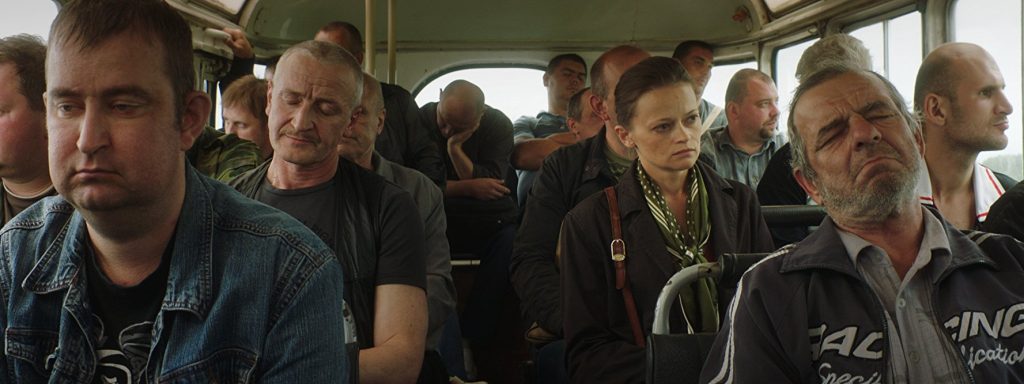Reviewed by Lee Hill
Vladimir Putin may be looking forward to another six years of running the Russian Federation, but his country’s best filmmakers will not give him an easy ride. Andrey Zvyagintsev’s Leviathan and Loveless have been recent state-of-the-nation molotovs lobbed at Mother Russia. Sergei Lotznitsa’s A Gentle Creature is a further reminder that, despite the monolithic philistinism that Putin embodies and revels in, dissident filmmaking is not just the province of one director of the moment.
Lotznitsa has been mounting a fifth column on the festival circuit since his debut, My Joy in 2010, a road movie that traveled through past and present as well as remote parts of Russia. Born in the former Soviet territory, Belarus, and raised in the Ukraine, Loznitsa brings an outsider’s intelligence and lyricism to his films. His second feature, In The Fog (2014), a story of Russian partisans on the run, was an unsentimental look at World War II. He has also made three formally ambitious documentaries in recent years – Maiden, The Event and Austerlitz – concerning the Ukrainian independence movement, the Soviet Coup of 1991 and Holocaust tourism respectively. Lotznitsa’s range, command of technique and courage to take on provocative subject matter makes most Western filmmaking look like, as Lenin might have said, the hack work of bourgeois intellectual careerists.
In the opening minutes of A Gentle Creature, it is clear Lotznitsa is not resting on his laurels. We see the nameless title character (Vasilina Makovtseva) waiting at bus stop in the middle of the Russian countryside on a hot summer’s day. Boarding a dilapidated bus, the young, but weary beyond her years woman stoically ignores the noisy passengers crowding her. Eventually she arrives home – more a shack than a cottage – where she finds that a package mailed to her husband has been returned without explanation. Her husband is serving an unspecified sentence for a murder he may or may not have committed. The woman decides to take time off from her job manning a desolate gas station to visit the prison and find out not only what has happened to the package, but why she had not heard from her husband in some time.
The journey she takes owes as much to Kafka as it does to the Dostoyevsky story it is loosely inspired by. With limited funds, she travels by night train (where most of her fellow passengers are drunk) to the grim town where the state prison is located. Here she encounters a sub-industry of gangsters, sexual predators and confidence artists preying on the friends and family of the convicts who are never seen. It is a moral universe where bureaucracy and criminality are crippled by warped notions of nationalism that may have only truly existed during the Second World War (and not without millions of lives destroyed by war, collectivization or purges).
Through stately master shots and long takes, the title character is subjected to a catalogue of insult and indignity. Almost every frame features her surrounded by shabbily clothed, rude and cynical citizens who either accept or exploit the corruption and incompetence of the system. Like the main character, we become witnesses to a broken state taken over by Putin’s “deplorables”, where as one character says, “they all suck here.”
Each vignette makes us feel like the fragile young woman at the centre of this bleak narrative; ignored or patronized by guards and clerks, kept awake by orgiastic partygoers at a boarding house run by a woman with sinister motives, or led on a merry-go-round by a taxi driver who doubles as a pimp and gofer for the local mob boss. Even the office of a human rights group is not immune from the claustrophobic futility that grips the town. Surrounded by old case files, complaining of vandalism and hindered rather than helped by her young volunteers, the besieged director also asks our heroine to fill out a form to no apparent end.
The first two hours of this film take us on a near hellish odyssey through a Russian state that is barely functioning let alone civil. Only when Lotznisa dramatically shifts gear in an elaborate dream sequence that owes much to the Fellini of 81/2 does the director falter. The dream-like coda is intended as satiric relief, but it doesn’t quite cohere as well as the rest of the film does.
Overall A Gentle Creature transcends its modest flaws thanks to performances that go beyond acting in the conventional sense and a masterful use of image and ambient sound, particularly bird-song. Loznitsa’s portrait of a modern Russia that can’t shake its totalitarian id never feels false or exaggerated. At a time when the world needs to understand what Russia is and wants more than ever, A Gentle Creature is an uncomfortable journey that viewers can’t afford not to go on.
